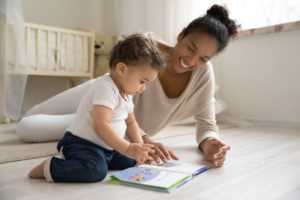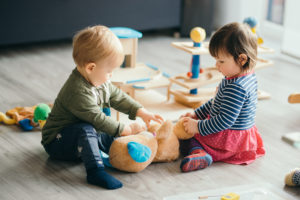Our family speaks many languages… How do I help my child with their English skills?
Any child who can speak, sign and/or understand more than one language is considered ‘multilingual’. This can start to happen even if the child is around listening to these languages without the adults speaking directly with the child. 
When children start learning more than one language, they are starting to take in and process the different words, sentences and grammar rules for the different languages. This means the way that they talk with, listen to and respond to others can look different; even if the child is not ‘fluent’ in all of the languages.
How ‘fluent’ a child is in a language, or how much they can speak and understand, depends on:
- How long they have been exposed to the language – has it been since they were a baby? Only in the last year?
- Who they use the languages with – family? friends? teachers?
- How often they hear the languages – every day? 2 days a week? how many hours a day?
- Where they use the languages – home? playground? kindergarten?
- Their motivation to use each language – which language do they ‘want’ to be using?
→ ‘Who’ they want to speak with is a very big motivator for learning and practising a language (e.g. wanting to use English so they can play with the other children at kindergarten)
How is it different to learning one language?
In general, multilingual language development is different because the words they are learning are spread out over the different languages, and they have to learn to use all of the rules and sentence types for all of their languages.
It is expected that the overall ‘language learning rate’ (i.e. how many words they use at a time) is the same as children learning 1 language – for example, using 1 word at age 1, using 2-words (e.g. daddy go) at age 2, using 3-5 word sentences at age 3, etc.

But, in multilingual children it is also common to see:
- A silent period – not talking much or at all while they process and ‘take in’ the new language
→ During this time, the child uses gestures or actions to communicate with others - Code-switching – mixing the words, grammar and/or sentence patterns of the different languages
→ This can happen in the same sentence!
→ But don’t worry! Research shows that multilingual children’s grammar and sentence structures catch up when they have a lot of time to hear and practise the different languages
- Vocabulary ‘appears’ delayed in one language
→ The total amount of words the child knows and uses is spread across all of the languages they are learning - **Difficulties with certain speech sounds in their second/third language
→ This often happens when the second or third language uses different speech sounds
→ For example, a child who speaks Khmer first can have trouble using the /h/ and soft /t/ sounds when they start learning the English language; and may drop the /h/ or swap the soft /t/ for a voiced /d/ sound
Difficulties with sentence structure and grammar are usually the last language skills to adjust.
Even though these things are expected, it is still okay to get extra advice from a Speech Pathologist to help your child’s communication skills grow faster. This can help them to express themselves, join in with others and communicate with the people around them (while their speech and language skills are catching up).
What can I do to help develop English language skills?
Research shows that there are many benefits to growing up with more than one language, like:
 Cognitive skills – attention, solving problems, vocabulary, planning, sound awareness (i.e. phonological skills), abstract thinking
Cognitive skills – attention, solving problems, vocabulary, planning, sound awareness (i.e. phonological skills), abstract thinking- Social skills – empathy, perspective taking, theory of mind (i.e. understanding what other people might bethinking and feeling)
- Emotional skills – connection to culture and self-identity, self-esteem, familyrelationships
- Academic skills – literacy (reading, writing, spelling), maths
If you keep speaking all of your languages, the child has time to learn the vocabulary and organisation of all of the different languages. It’s okay if you do not feel confident in every language, because you can demonstrate to your child how they can use different strategies when they can’t remember a word or are not sure how to say their message (for example, showing the other person, using their hands, describing its parts).
You can help grow language skills by:
- Practising conversations – research shows that children best learn language when they are involved in listening to, answering, and speaking the language they are learning,
→ This can be in play, daily routines (e.g. bathing, eating, dressing) and reading books!
→ Say what you see and ask questions, give your child the chance to ‘speak’ and use actions (e.g. pointing, showing) to answer you.
- Shared book reading – reading a storybook while making it a shared activity or conversation,
→ Mix up reading the words and talking about the pictures – you can even make up your own words!
→ Ask questions about the pictures, or ask your child to point to/show you things,
→ Do actions that match the words and pictures,
→ Add funny faces and character voices to make it interesting and fun!
→ Use shorter sentences (with correct grammar), and wait 3-5 seconds before you keep reading – this gives your child time to take in what you said. - Be a narrator – describe and say what actions you are doing when you are playing with your child or helping them with daily routines (e.g. bathing, cooking, dressing),
→ This is a great way to teach your child the names of items and actions,
→ You can repeat the same types of words, so your child has more opportunities to hear and practise these words,
→ For example, “I am cutting the tomato. I am putting the tomato in the bowl. I am slicing the lemon. I am squeezing the lemon on the tomato. The lemon is juicy.”
You can do these things in all of the different languages your child speaks, so that their skills in every language continue to grow! To get your child ready for Prep/school, working on ‘actions’ (called ‘verbs’) and different ‘concepts’ (like sizes, shapes, places, amou
nts) are good to practise because these words are important for understanding instructions and are harder to show. You can speak with a Speech Pathologist or your kindergarten teacher about what types of words and language skills to focus on in English.
How do I know if they are having difficulties with their language?
Even though multilingual children develop speech and language differently, it is important to watch for any difficulties. The earlier we start therapy, the more time there is to develop the child’s communication. Here are some common signs that your child might need more help from a Speech Pathologist.

They are frustrated or upset when they communicate.
We want communication to be easy and a positive experience for children! So it is important to get extra help if they get upset because others can’t understand what they are saying or they don’t know how to get others to understand them.
All of their languages are not improving.
If your child is having difficulties with their sentences and vocabulary (words) in every language, even though you spend a lot of time practising with them, this can be a sign that there are difficulties going on.
The word combinations and sentences they use are not as long as other children.
Depending on when the child started learning their different languages, their sentence length should match other children, even if their grammar, sentence structure and vocabulary are still developing. If you notice that their sentences are a lot shorter (e.g. only using 2 words, when others are using 5-6), this could be a sign that they need support growing their sentence structure.
Their speech/pronunciation of words can’t be understood.
Clear and correct speech sounds are an important skill for school and talking, as we need correct sounds to be understood and to learn how to read, write and spell.
If you have more questions about multilingual language development, and/or how a Speech Pathologist can support you, call or email our Client Care team through [email protected] or (07) 3265 4495.
If you are an early childhood educator, check out our educator essentials page for resources and content to support multilingual children.

Thida Hantun
Speech Pathologist,Non Therapy Services Coordinator & CPD Coordinator
Reviewed March 2025
